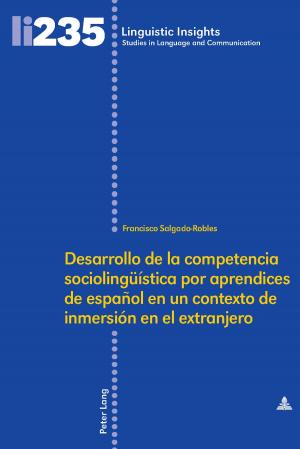Supporting Internationalisation through Languages and Culture in the Twenty-First-Century University
Nonfiction, Reference & Language, Education & Teaching, Teaching, Language Experience Approach, Educational Theory, Multicultural Education, Philosophy & Social Aspects| Author: | ISBN: | 9783035395051 | |
| Publisher: | Peter Lang | Publication: | November 25, 2014 |
| Imprint: | Peter Lang AG, Internationaler Verlag der Wissenschaften | Language: | English |
| Author: | |
| ISBN: | 9783035395051 |
| Publisher: | Peter Lang |
| Publication: | November 25, 2014 |
| Imprint: | Peter Lang AG, Internationaler Verlag der Wissenschaften |
| Language: | English |
‘Internationalisation’ is a key issue impacting on higher education today, but what is actually meant by this term and how does it relate to the notion of ‘global citizenship’, which also features prominently on the higher education agenda? How does the promotion of foreign language learning and intercultural communication help inform the pursuit of internationalisation? And, as the twenty-first century progresses, how are universities meeting the challenges of developing languages-based curricula that reflect the requirements of an increasingly global marketplace?
This book brings together ten interconnected chapters from an international group of scholars who explore how language teaching and learning strategies and cross-cultural understanding support the cause of internationalisation in the modern higher education arena. The book will be of interest to both managers and practitioners who require an understanding of how the promotion of languages and intercultural knowledge informs the cause of internationalisation at strategic and operational levels within contemporary higher education.
‘Internationalisation’ is a key issue impacting on higher education today, but what is actually meant by this term and how does it relate to the notion of ‘global citizenship’, which also features prominently on the higher education agenda? How does the promotion of foreign language learning and intercultural communication help inform the pursuit of internationalisation? And, as the twenty-first century progresses, how are universities meeting the challenges of developing languages-based curricula that reflect the requirements of an increasingly global marketplace?
This book brings together ten interconnected chapters from an international group of scholars who explore how language teaching and learning strategies and cross-cultural understanding support the cause of internationalisation in the modern higher education arena. The book will be of interest to both managers and practitioners who require an understanding of how the promotion of languages and intercultural knowledge informs the cause of internationalisation at strategic and operational levels within contemporary higher education.















